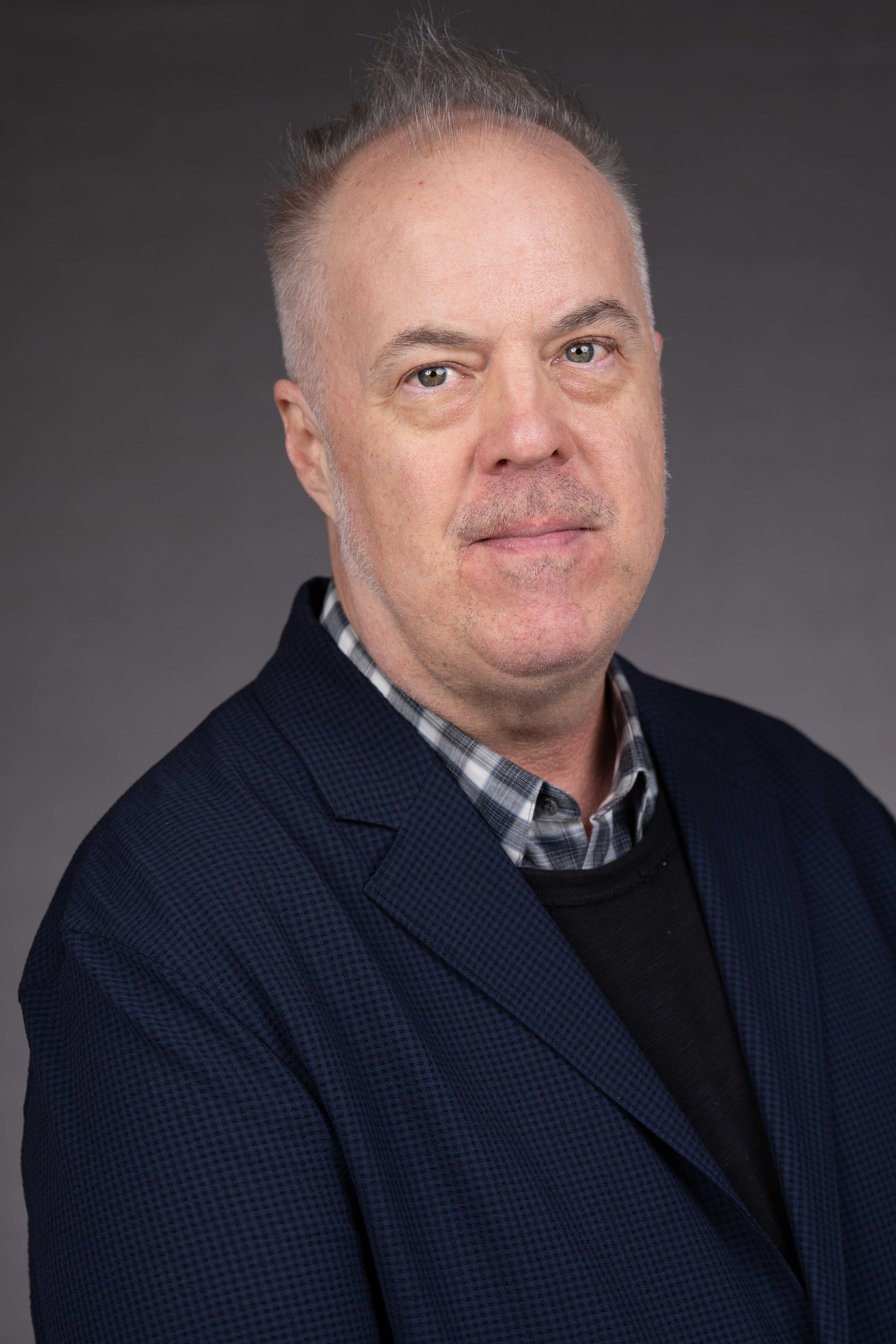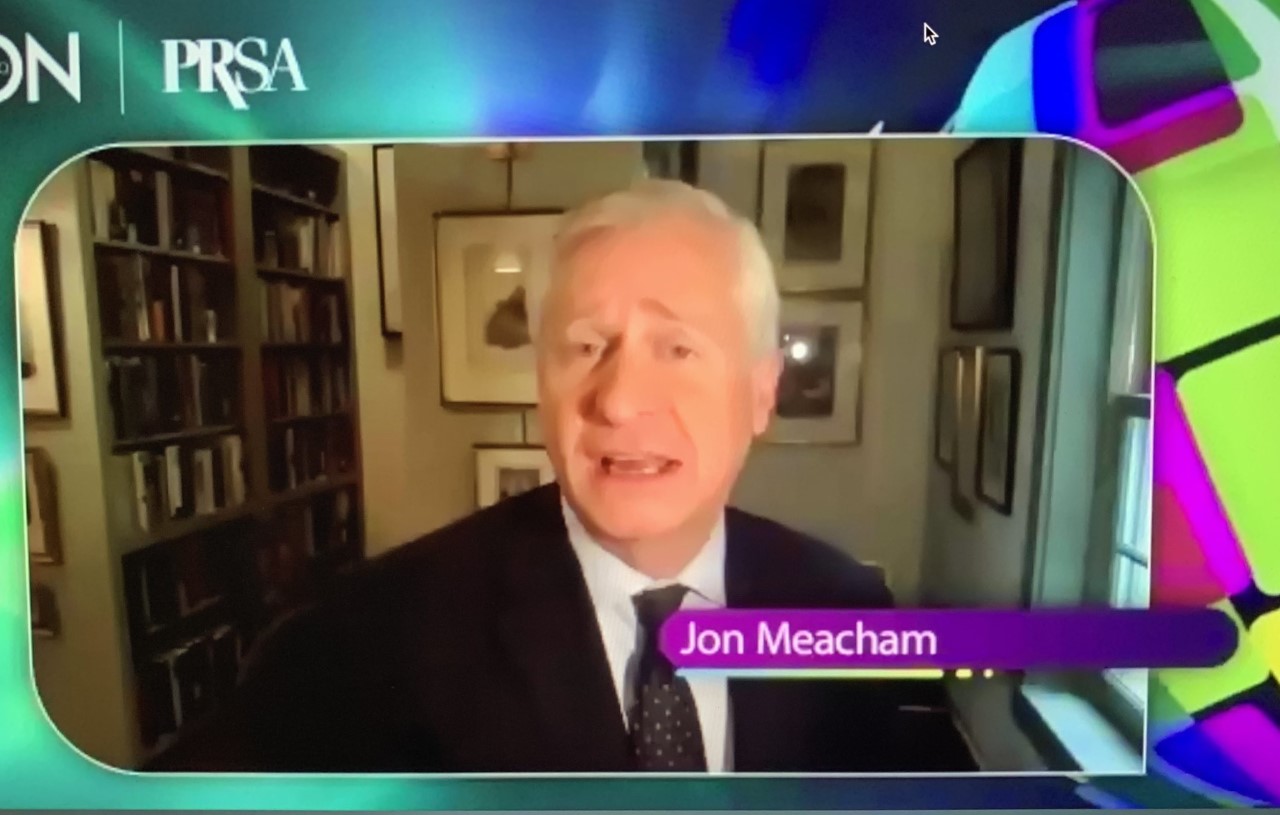Jon Meacham on How the Past Prepares Us for the Present
By John Elsasser
November-December 2020
Jon Meacham started his opening General Session keynote at PRSA’s ICON 2020 virtual conference on Oct. 26 with an apology.
“I’m sorry there’s nothing going on in the world to talk about. There’s a very quiet, uninteresting election… and the country seems so unified and pulled together that you have to search for division and conflict,” deadpanned the presidential historian and Pulitzer Prize-winning author.
According to Meacham, there are many people who believe that the country has never been more divided than we are now — with the possible exception of the 1850s.
However, in his view, our country has been through similar struggles in the past and can once again emerge stronger than before. During these contentious times in America today, he said there are two things worth avoiding in our public conversations.
“One is nostalgia, which is the sense that things were always easier in the past. The other is the narcissism of the present, the notion that our problems, our challenges are insuperable and uniquely oppressive,” Meacham said during a thoughtful 45-minute talk. “Avoiding nostalgia is important because, if everything in the past was easier, that forecloses the possibility of learning from it.”
He said that history is not necessarily a GPS, but a diagnostic guide.
“There are certain forces and conditions that present themselves anew and suggest a certain diagnosis, and we know from experience what steps can be taken to ameliorate conditions of the present and truly create that more perfect Union,” said Meacham, who won the 2009 Pulitzer Prize for his book “American Lion: Andrew Jackson in the White House.”
Through the years
Meacham went on to discuss characteristics that have marked American generations — both of leadership and of followership.
“Remember: We’re all in this together. A republic is the sum of its parts. Our dispositions — yours and mine of hearts and minds — matter enormously… because a republic is the fullest expression of our individual dispositions.”
During his speech, which amplified the themes of his 2018 book, “The Soul of America: The Battle for Our Better Angels,” Meacham noted that divisive politics and political acrimony have been near-constant in the United States, and the lessons of the past can lead us into the future.
The common denominator is not a party label of the past or loyalty to whatever conservatism or liberalism means in a given moment, he said.
“The common denominator is adherence to the very American tradition, the enlightenment project that, in fact, we are created equal and that everybody should have what [President Abraham] Lincoln called an open field and a fair chance to rise as far as their industry, intelligence and enterprise could take them.”
In Meacham’s view, each moment in American life is defined by the extent to which we create that open field or the extent to which we attempt to put obstacles on that field for certain groups.
“And if that’s the test, then, every day, we have the ability to see whether we are being true to those better angels or whether those darker impulses of selfishness are being predominant,” he said. “This is incredibly empowering because it means that every problem we confront in our public or private life has a pretty clear test. We can decide if we are being generous or if we are being selfish, and sometimes we’re going to choose the selfish path — that’s human nature.”
Three characteristics have emerged from American history to help us meet this test: courage, honesty and empathy.
Courage is essential, he said. “Hope is always, ultimately, more strengthening and vital than fear.” Of honesty, he said: “When in doubt, tell the truth.” And empathy? “Without it, the republic falls.”
As we continue to confront daily life moving forward, Meacham said to think about the decisions that we make.
“Do they fit on a spectrum where we’re all in this together, or are they more likely to fit in the spectrum where people have automatic authority over all of us?” he said. “I think America is at its best when we’re in this together. We can think for ourselves, we can make the best decisions we can and press forward.”
Post-Speech Q&A With Jon Meacham
On advancing progress:
Change in America comes not when the powerful wake up one morning and decide to do it but when the voices of the powerless, the whispered hopes of the many, capture the attention of the powerful and the few.
And that dialecting is absolutely vital. And it’s why [the late U.S. Rep.] John Lewis matters so much, it’s why Martin Luther King matters so much. This is not simply about civil rights, it’s about suffrage, and civil rights, and workers’ rights, and widespread prosperity. It’s about the American Revolution. It’s about people — the many saying that we believe our happiness is best pursued when there’s the ability and the free and open field in front of us.
So all of us matter in this. It matters who we vote for, it matters how we behave in the public square. Those tweets matter, those Facebook postings matter because they all create a climate where it’s either harder to get things done or easier.
On connecting with people who live in a different reality:
You just have to tell the stories that matter to you. You have to listen but there are moments, and I’m sure we all have this in our families and our work circles — there are people who think things that are so opposite to what you think, that you kind of want to give up, right?
We’re in a long cultural Cold War right now. That’s an analogy that I would defend. There’s an existential debate and conflict between two different views of the world, and there are episodic flare-ups that are manifestations of that larger conflict. But the way we won the Cold War, the way the good guys won the Cold War was being patient, being open and taking chances on diplomacy when we could.
On the legacy of John Lewis, the subject of Meacham’s most recent book:
John Lewis was the most faithful person I’ve ever known. He closed the gap between profession of ideals and the practice of them more significantly than anyone else I’ve ever encountered. He believed in the gospel, he believed in the dignity and equality of all people, and he acted on it again, and again, and again at enormous personal risk of life and limb.
I believe that his story must be told perpetually because it is a story of heroic virtue. And if we can at least get within six or seven miles of John Lewis’ example, we’ll be better off.



